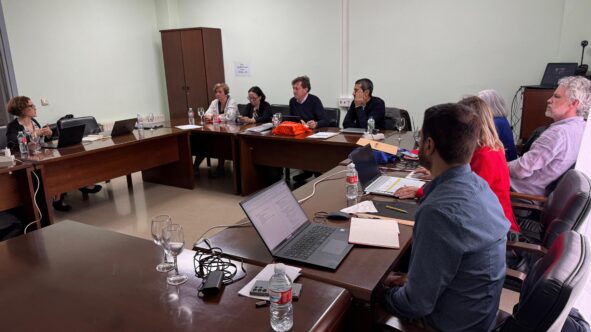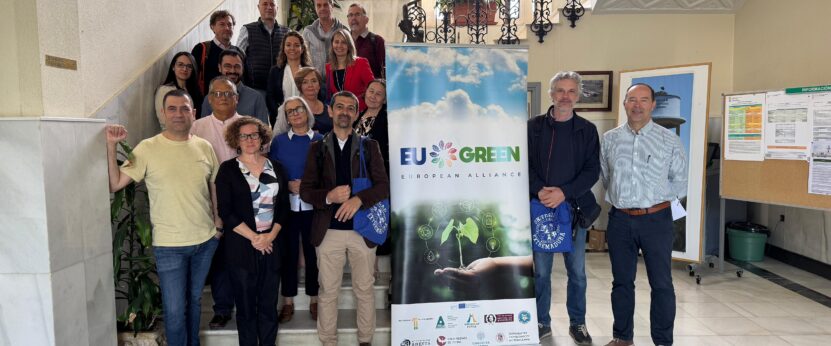- Expertos de cinco universidades europeas se reúnen en Badajoz y Évora para avanzar en el diseño de un máster centrado en la sostenibilidad de ecosistemas agrícolas y urbanos
- Una iniciativa de EU GREEN para fomentar la colaboración académica hacia una Europa más sostenible
La segunda reunión transnacional del Máster INHERITANCE (Sciences and Technologies for the Ecological Transition of Agricultural and Urban Ecosystems) se está celebrando del 19 al 21 de mayo en las ciudades de Badajoz (España) y Évora (Portugal). El encuentro comenzó ayer en la Escuela de Ingenierías Agrarias de la Universidad de Extremadura (UEx), donde representantes de las cinco universidades están trabajando en el desarrollo de esta ambiciosa propuesta educativa.
El Máster INHERITANCE, enmarcado en la alianza universitaria europea EU GREEN, reúne a instituciones de Italia (Universidad de Parma), Portugal (Universidad de Évora), España (Universidad de Extremadura), Francia (Universidad de Angers) y Polonia (Universidad de Wroclaw). La jornada inaugural contó también con la participación del equipo directivo de la Escuela de Ingenierías Agrarias y representantes del Vicerrectorado de Planificación Académica de la UEx.
Un máster innovador con visión europea
Durante las sesiones de trabajo se han abordado aspectos clave como el diseño del plan de estudios, el reparto de asignaturas y responsabilidades docentes, los criterios de admisión, el perfil del alumnado y las salidas profesionales. También se ha avanzado en los trámites para la futura acreditación oficial del programa.
 El máster, de segundo ciclo y dos años de duración, formará profesionales capaces de liderar la transición ecológica en contextos agrícolas y urbanos. El primer año ofrece una base común en estadística, modelización, economía, legislación y ecología. En el segundo, el alumnado podrá especializarse en la transición ecológica de agroecosistemas o de ecosistemas urbanos.
El máster, de segundo ciclo y dos años de duración, formará profesionales capaces de liderar la transición ecológica en contextos agrícolas y urbanos. El primer año ofrece una base común en estadística, modelización, economía, legislación y ecología. En el segundo, el alumnado podrá especializarse en la transición ecológica de agroecosistemas o de ecosistemas urbanos.
Uno de los principales valores del programa es su enfoque pedagógico innovador, que combina teoría con proyectos prácticos, tanto individuales como colaborativos. Esta metodología fomenta el aprendizaje activo, el pensamiento crítico y el desarrollo de habilidades comunicativas, organizativas y relacionales, fundamentales para responder a los desafíos ecológicos y sociales en un contexto europeo diverso.
Segunda jornada en Évora
Las sesiones continúan hoy martes y mañana miércoles 21 de mayo en la Universidad de Évora, concretamente en la Casa Cordovil, donde el consorcio internacional se reúne para avanzar en la definición académica y operativa del Máster INHERITANCE. La jornada del martes comenzará con la bienvenida institucional por parte del Vicerrectorado de Educación de la universidad de Évora, seguida de una presentación general del programa conjunto, el análisis del estado del proceso de acreditación europea y la distribución de responsabilidades entre las universidades socias. A lo largo del día se trabajará también en la definición del proceso de admisión, la validación de los planes de estudio y la asignación de responsabilidades docentes. El miércoles estará dedicado al análisis de necesidades a nivel local, macroregional y europeo, así como a la identificación de las fortalezas y características propias de cada universidad participante. Estas jornadas concluirán con la elaboración de un plan de acción detallado para los próximos meses.
El Máster INHERITANCE se perfila como una herramienta estratégica para preparar a la próxima generación de líderes en la transformación ecológica de los sistemas productivos y urbanos.
The School of Agricultural Engineering at the University of Extremadura hosts the second meeting of the INHERITANCE Master’s, a key project for Europe’s ecological transition
- Experts from Five European Universities Meet in Badajoz and Évora to Advance the Design of a Master’s Program Focused on the Sustainability of Agricultural and Urban Ecosystems
- An EU GREEN initiative to promote academic cooperation for sustainable transformation in Europe
The second transnational meeting of the INHERITANCE Master’s Program (Sciences and Technologies for the Ecological Transition of Agricultural and Urban Ecosystems) is taking place from May 19 to 21 in the cities of Badajoz (Spain) and Évora (Portugal). The event began yesterday at the School of Agricultural Engineering of the University of Extremadura (UEx), where representatives from five partner universities are working together on the development of this ambitious academic initiative.
The INHERITANCE Master’s, part of the EU GREEN European university alliance, brings together institutions from Italy (University of Parma), Portugal (University of Évora), Spain (University of Extremadura), France (University of Angers), and Poland (University of Wroclaw). The opening session also included the participation of the management team from the School of Agricultural Engineering and representatives from the Vice-Rectorate for Academic Planning at UEx.
An Innovative Master’s Program with a European Vision
Throughout the working sessions, key aspects have been addressed, including the design of the curriculum, distribution of courses and teaching responsibilities, admission criteria, student profile, and career opportunities. Progress has also been made in the administrative process required for official accreditation of the degree.
This two-year second-cycle Master aims to train professionals capable of leading the ecological transition in both agricultural and urban systems. The first year provides a shared foundation in statistics, modeling, economics, legislation, and ecology. In the second year, students will choose between two specializations: the ecological transition of agroecosystems or of urban ecosystems.
One of the program’s core strengths is its innovative pedagogical approach, which combines theoretical instruction with practical projects, both individual and collaborative. This methodology encourages active learning, critical thinking, and the development of communication, organizational, and interpersonal skills—essential for addressing ecological and social challenges across Europe’s diverse territories.
Second Meeting Day in Évora
The working sessions continue today, tuesday, and tomorrow, wednesday, May 21, at the University of Évora, specifically at Casa Cordovil, where the international consortium is focusing on refining the academic and operational structure of the INHERITANCE Master’s. Tuesday’s agenda begins with a formal welcome by the University of Évora’s Vice-Rectorate for Education, followed by a general presentation of the joint program, an overview of the European accreditation process, and discussion on the distribution of responsibilities among partner institutions. The day will also include work on defining the application and selection process, validating the course structure, and assigning teaching responsibilities.
On Wednesday, the sessions will focus on a needs analysis at local, macro-regional, and European levels, as well as identifying the distinctive strengths and characteristics of each partner university. The meeting will conclude with the development of a detailed action plan for the coming months, outlining objectives, deadlines, and assigned responsibilities.
The INHERITANCE Master’s stands out as a strategic tool to prepare the next generation of leaders for the ecological transformation of agricultural and urban production systems.
